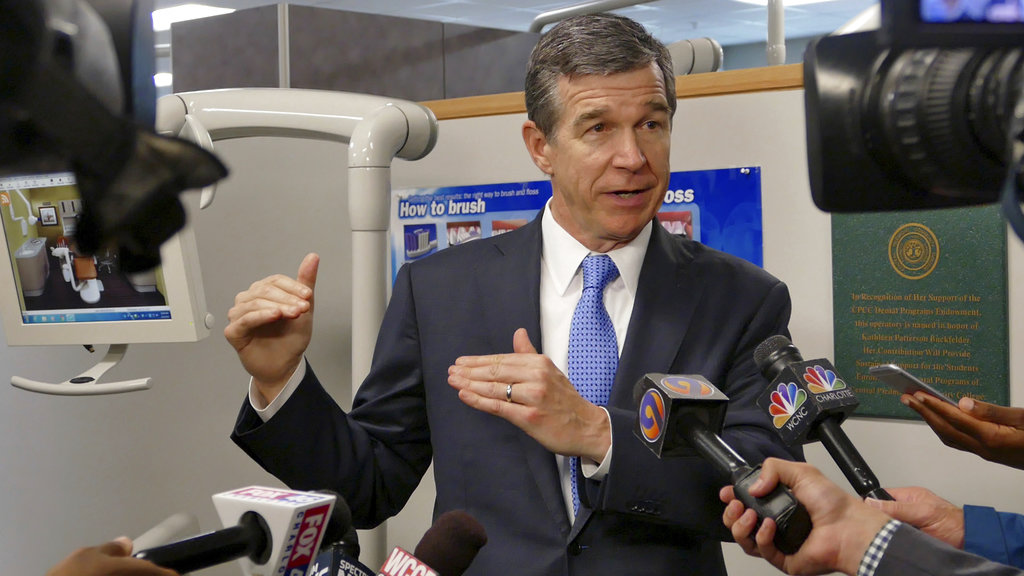Colin Campbell: Which NC possibility will we see?
Published 12:00 am Tuesday, October 30, 2018

- Gov. Roy Cooper AP photo
RALEIGH — Your vote in state House and Senate races could be your best chance to make a difference in this year’s election.
Only three of the state’s 13 congressional districts are competitive, so if you live in one of the 10 that are gerrymandered to re-elect an incumbent, you don’t really get to help decide which party controls the U.S. House. And with no U.S. Senate race in North Carolina this year, we don’t have any say in power shifts there.
You might be motivated to vote this year because you either love or hate President Donald Trump. But you should also be considering your opinion of the Republican-led N.C. General Assembly and Democratic Gov. Roy Cooper. This could be the year the power dynamic in the legislature changes, and nearly every race has both a Republican and Democrat — so even voters in gerrymandered districts will get a choice on the ballot.
How will the outcome of legislative races affect your life? Here are the three potential outcomes for the state House and Senate this election, and a look at the policies you can expect from Raleigh under each possibility:
• Democrats break the GOP “supermajority,” but Republicans stay in power: This is the most likely scenario. Democrats need to gain an additional four seats in the House or an additional six seats in the Senate, and Cooper’s veto power would actually mean something.
For the Democrat’s first two years in office, Republicans have used their veto-proof majorities to override nearly all of his vetoes — largely sidelining the governor from the legislative process. Breaking the supermajority in at least one chamber would allow Democrats to block controversial GOP bills.
That means Cooper would likely get a bigger role in shaping the state budget, as Republican budget writers would be forced to compromise with him. Your taxes probably wouldn’t change because Democrats wouldn’t have enough power to raise rates and Republicans wouldn’t have enough power to cut them.
Bipartisan compromises would be required on teacher pay, education spending and jobs initiatives — unless the two sides dig in and create legislative gridlock. Republicans might pursue controversial social issues, like abortion restrictions or looser gun laws, but Cooper and Democrats could block the measures from becoming law. But Democrats wouldn’t have any big policy wins, so don’t look for Medicaid expansion, redistricting reform or a full repeal of House Bill 2.
• Republicans fend off challengers and keep their supermajorities: If this happens, not much changes in Raleigh. House Speaker Tim Moore and Senate leader Phil Berger will shape state government with Cooper on the sidelines.
Look for more income tax cuts partially offset by expanded sales taxes. More environmental regulations could be rolled back at the request of major companies. Spending levels will remain conservative, with a push to beef up the rainy day fund after Hurricane Florence.
The one upside for Democrats? There will be more things for their supporters to get mad about, which could energize the party for 2020 elections.
• Democrats take the majority in the legislature: This is the least likely scenario, as it would require a massive “blue wave” to overcome House and Senate districts drawn to favor Republicans. So far, early voting statistics haven’t shown the big drop in GOP turnout that you’d see in that sort of election.
To oust Moore and Berger and put Democrats in charge, the Dems need a net gain of 16 House seats and 11 Senate seats. That change would empower Cooper to enact most of his agenda: You’d see Medicaid expansion and a big increase in education spending, possibly funded by reversing some GOP tax cuts — particularly the corporate income tax rate. Confederate statues at the state Capitol and elsewhere would be moved.
Which of these scenarios comes true in November? Head to the polls and help determine the next chapter in North Carolina’s choose your own adventure book.
Colin Campbell is editor of the Insider State Government News Service.

